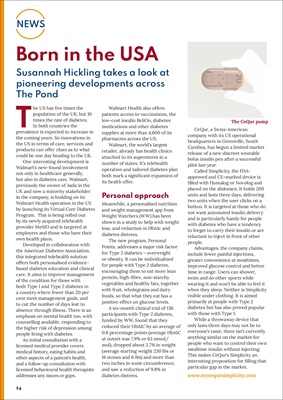
14
NEWS
Born in the USA
Susannah Hickling takes a look at
pioneering developments across
The Pond
The US has five times the
population of the UK, but 10
times the rate of diabetes.
In both countries the
prevalence is expected to increase in
the coming years. So innovations in
the US in terms of care, services and
products can offer clues as to what
could be one day heading to the UK.
One interesting development is
Walmart's new-found involvement
not only in healthcare generally,
but also in diabetes care. Walmart,
previously the owner of Asda in the
UK and now a minority stakeholder
in the company, is building on its
Walmart Health operation in the US
by launching its Virtual Care Diabetes
Program. This is being rolled out
by its newly acquired telehealth
provider MeMD and is targeted at
employers and those who have their
own health plans.
Developed in collaboration with
the American Diabetes Association,
this integrated telehealth solution
offers both personalised evidencebased
diabetes education and clinical
care. It aims to improve management
of the condition for those with
both Type 1 and Type 2 diabetes in
a country where fewer than 20 per
cent meet management goals, and
to cut the number of days lost to
absence through illness. There is an
emphasis on mental health too, with
counselling available, responding to
the higher risk of depression among
people living with diabetes.
An initial consultation with a
licensed medical provider covers
medical history, eating habits and
other aspects of a patient's health,
and a follow-up consultation with
licensed behavioural health therapists
addresses any issues or gaps.
Walmart Health also offers
patients access to vaccinations, the
low-cost insulin ReliOn, diabetes
medications and other diabetes
supplies at more than 4,600 of its
pharmacies across the US.
Walmart, the world's largest
retailer, already has health clinics
attached to its superstores in a
number of states. It's telehealth
operation and tailored diabetes plan
both mark a significant expansion of
its health offer.
Personal approach
Meanwhile, a personalised nutrition
and weight management app from
Weight Watchers (WW) has been
shown in a study to help with weight
loss, and reduction in HbA1c and
diabetes distress.
The new program, Personal
Points, addresses a major risk factor
for Type 2 diabetes - overweight
or obesity. It can be individualised
for people with Type 2 diabetes,
encouraging them to eat more lean
protein, high-fibre, non-starchy
vegetables and healthy fats, together
with fruit, wholegrains and dairy
foods, so that what they eat has a
positive effect on glucose levels.
A six-month clinical trial of 136
participants with Type 2 diabetes,
funded by WW, found that they
reduced their HbA1C by an average of
0.8 percentage points (average HbA1C
at outset was 7.9% or 63 mmol/
mol), dropped about 5.7% in weight
(average starting weight 230 lbs or
16 stones and 6 lbs) and more than
two inches in waist circumference,
and saw a reduction of 9.8% in
diabetes distress.
CeQur, a Swiss-American
company with its US operational
headquarters in Greenville, South
Carolina, has begun a limited market
release of a new discreet wearable
bolus insulin pen after a successful
pilot last year.
Called Simplicity, the FDAapproved
and CE-marked device is
filled with Humalog or Novolog and
placed on the abdomen. It holds 200
units and lasts three days, delivering
two units when the user clicks on a
button. It is targeted at those who do
not want automated insulin delivery
and is particularly handy for people
with diabetes who have a tendency
to forget to carry their insulin or are
reluctant to inject in front of other
people.
Advantages, the company claims,
include fewer painful injections,
greater convenience at mealtimes,
improved glucose control and better
time in range. Users can shower,
swim and do other sports while
wearing it and won't be able to feel it
when they sleep. Neither is Simplicity
visible under clothing. It is aimed
primarily at people with Type 2
diabetes but has also proved popular
with those with Type 1.
While a throwaway device that
only lasts three days may not be to
everyone's taste, there isn't currently
anything similar on the market for
people who want to control their own
mealtime insulin without injecting.
This makes CeQur's Simplicity an
interesting proposition for filling that
particular gap in the market.
www.myceqursimplicity.com